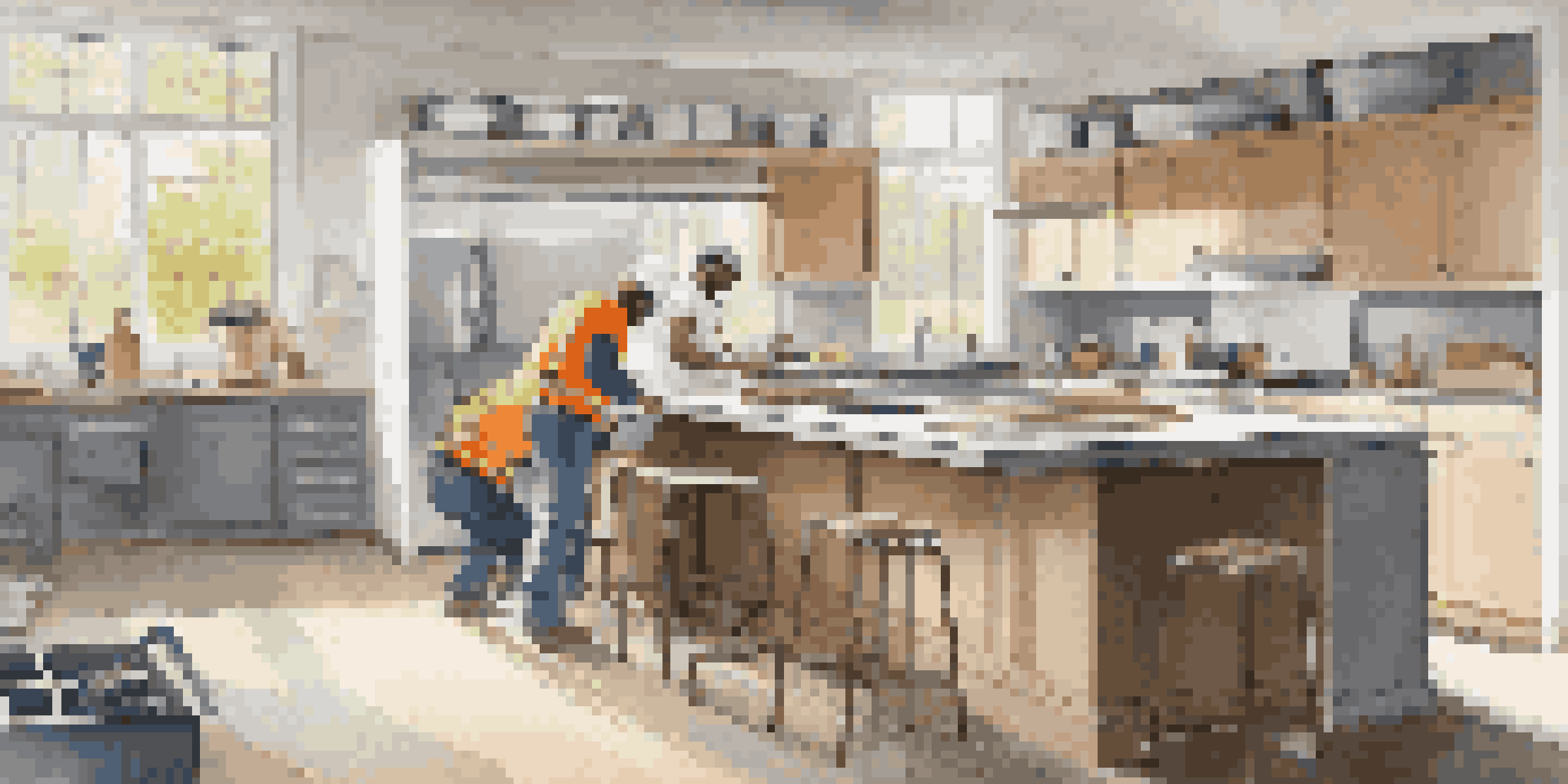How to Prepare Your Home for a Smooth Renovation

Understanding Your Renovation Goals and Timeline
Before diving into any renovation, it’s crucial to define your goals. Are you looking to update a room, expand your space, or improve functionality? Understanding what you want to achieve will guide every decision you make during the renovation process.
A goal without a plan is just a wish.
Next, consider your timeline. How long do you expect the renovation to take? Setting a realistic schedule not only helps you stay organized but also keeps the project on track. This way, you won’t be left living in chaos longer than necessary.
Finally, discuss your plans with your family or housemates. Ensuring everyone is on the same page about the goals and timeline can help prevent misunderstandings and keep the peace during what can be a stressful time.
Budgeting for Your Renovation: Key Considerations
Budgeting is one of the most important aspects of preparing for a renovation. Start by assessing how much you’re willing to spend and consider all potential costs, including materials, labor, and unexpected expenses. It’s wise to add a buffer of about 10-20% for surprises.

Researching costs for materials and labor in advance can give you a clearer picture of what to expect. Websites and local suppliers can provide pricing information. Additionally, consider whether you’ll be able to tackle any DIY aspects of the renovation to save some money.
Define Goals and Timeline
Clearly outlining your renovation goals and setting a realistic timeline are essential steps to ensure a smooth project.
Don’t forget to account for the costs of living during the renovation. If your project will render parts of your home unusable, you may need to budget for temporary accommodations or extra expenses like takeout meals.
Hiring the Right Professionals for Your Renovation
Choosing the right professionals can make all the difference in your renovation experience. Start by asking for recommendations from friends or family who have recently completed similar projects. A personal referral often leads to finding trustworthy contractors.
The details are not the details. They make the design.
Once you have a list of potential hires, take the time to research their backgrounds. Check online reviews, request references, and review their previous work. This diligence ensures that you’re partnering with someone who aligns with your vision and has a proven track record.
Don’t hesitate to interview your top choices. Discuss your renovation goals and gauge their understanding and enthusiasm for the project. A good contractor should not only have the skills but also communicate clearly and be willing to collaborate with you throughout the process.
Clearing Out Your Space for the Renovation
Before the renovation begins, take the time to clear out the area that will be worked on. This includes removing furniture, decor, and personal belongings to protect them from dust and damage. A clean space allows workers to move freely and efficiently.
Consider temporarily relocating items to another room or storage unit. This organization helps streamline the renovation process and gives you a better sense of how the space will look once the work is finished.
Budget for Unexpected Costs
Creating a detailed budget, including a buffer for surprises, is crucial for managing expenses during your renovation.
Label boxes and keep an inventory of what you’ve moved. This will save you time and frustration when you’re ready to put everything back in its place once the renovation is complete.
Preparing Your Home for Dust and Debris
Renovations can be messy, so it’s crucial to prepare your home for the inevitable dust and debris. Start by sealing off the work area using plastic sheeting and tape. This helps contain the mess and keeps other parts of your home cleaner.
Consider using air purifiers or fans to help improve air quality during the renovation. These tools can help filter out dust particles and keep the air in your home fresher, making it safer for you and your family.
Additionally, make sure to communicate with your contractors about their cleaning practices. A professional team will typically clean up each day, but it’s good to establish expectations to maintain a manageable living environment.
Informing Neighbors About Your Renovation Plans
Renovations can be noisy and disruptive, so it’s polite to inform your neighbors about your plans. A simple conversation or a friendly note can go a long way in maintaining good relationships. Let them know the expected timeline and hours during which work will be taking place.
Consider discussing any potential inconveniences your renovation might cause. For example, if there will be limited parking or heavy machinery involved, giving your neighbors a heads-up can help them plan accordingly.
Communicate with Neighbors
Informing your neighbors about your renovation plans can help maintain good relationships and minimize disruptions.
Being considerate and communicative can foster goodwill, and in some cases, neighbors might even offer support or assistance during your renovation process.
Setting Up a Temporary Living Space During Renovation
Depending on the scope of your renovation, you may need to set up a temporary living space. Identify areas of your home that will remain usable, such as bedrooms or bathrooms, and rearrange furniture to create a comfortable haven amidst the chaos.
Consider creating a makeshift kitchen if your main kitchen will be out of commission. A coffee maker, microwave, and some essential utensils can go a long way in keeping your daily routine on track.

Don’t forget to set up a comfortable area for relaxation. Having a designated space to unwind at the end of the day can help you cope with the stress of renovation and keep your spirits high.
Staying Organized and Communicative During the Process
Throughout the renovation, staying organized is key. Keep track of all important documents, contracts, and receipts in one place. This will make it easier to reference information as needed and ensure you’re staying within budget.
Regular communication with your contractor is also essential. Schedule check-ins to discuss progress, address concerns, and make any necessary adjustments to plans. This collaboration will help keep the project on track and ensure your vision is realized.
Lastly, don’t forget to celebrate small milestones during your renovation journey. Taking time to appreciate progress can make the process feel more rewarding and less overwhelming.